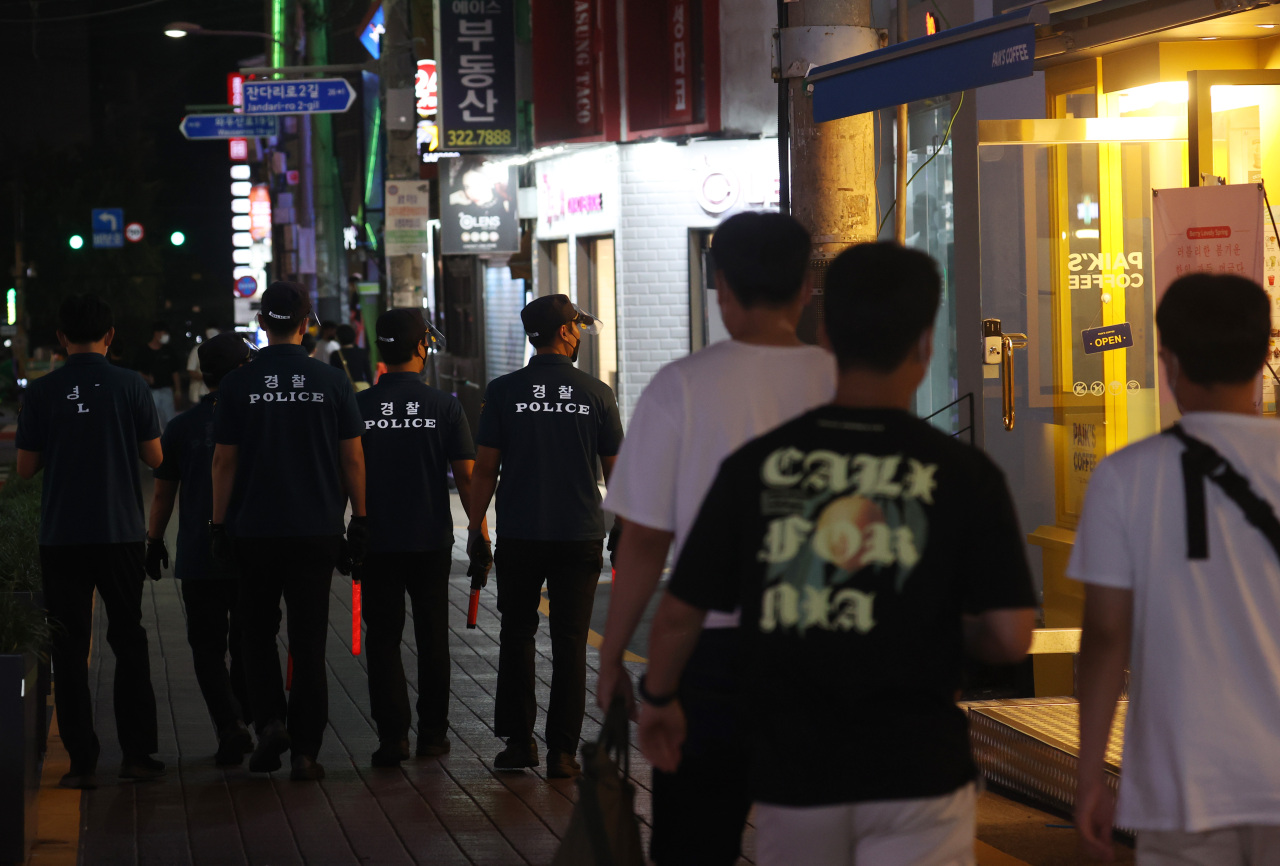In most parts of a fourth wave-struck Korea, “adult entertainment” businesses were able to stay open until outbreaks forced closures.
A third of about 200 cases detected this month so far on Jeju Island, a popular summer destination, were linked to adult entertainment spots, prompting officials there to close them down while contact tracing is underway.
Starting this week, the island has been placed into the second-strictest level of social distancing in the four-tier scheme, banning places like food outlets and spas from operating in the nighttime.
The prevalence of outbreaks at adult entertainment businesses had Jeju officials consider including people who work there for priority vaccinations, before the plan had to be retracted Monday. Jeju residents did not like that idea.
Two weeks ago, a delta variant outbreak was traced to more than 40 clients and “hostesses” who entertained them at a karaoke-room venue in Daejeon, not long after a similar outbreak took place at a bar offering escort services in nearby Cheongju, North Chungcheong Province.
In late June, all versions of karaoke businesses were shut down across Goyang, Gyeonggi Province, after a series of outbreaks among some escorts and their clients, not all of whom could be tracked down. Earlier that same month, Seoul ordered employees of karaoke bars -- which became a frequent source of large outbreaks -- to take a test.
In past weeks, Busan and nearby cities in South Gyeongsang Province, Masan, Gimhae and Tongyeong, all reported outbreaks at businesses associated with commercial sex services such as “room salons.”
The Korea Disease Control and Prevention Agency said in a recent briefing that cases occurring since May were largely characterized by “nightlife activities.” “Eating and drinking together, and talking without masks in a poorly ventilated space, create an optimal environment for contagion,” said Lee Sang-won, head of the agency’s contact tracing team.
Dr. Kim Woo-joo, an infectious disease professor at Korea University, pointed out that even under the most stringent tier of the country’s four-tier social distancing scheme, adult entertainment businesses were able to stay open until 10 p.m.
“What bewilders me is that bars or pubs with dance floors and nightclubs cannot open while arguably riskier facilities can. This does not reflect proper risk assessments,” he said.
He added that the Ministry of Health and Welfare was lacking central guidance, opting instead for “a laissez-faire approach.” “Municipalities are having to revise or implement extra measures after outbreaks at places with high risk that are overlooked by the guidelines from the central authorities.”
Dr. Jung Ki-suck, a previous head of the Korea Centers for Disease Control and Prevention, said the nature of such businesses, which tend to operate discreetly, often rendered contact tracing efforts pointless, creating a “loophole in surveillance.”
“Korea’s social distancing system is restricting personal gatherings too strictly, while giving more freedom to businesses,” he said. “We let some of the riskiest of places continue operations under the fourth and strictest tier.”
Regarding the nightlife outbreaks, Ministry of Health and Welfare spokesperson Son Young-rae told reporters during a closed-door briefing Monday that from July municipal authorities had the autonomy to adopt measures to address transmission patterns in their region.
“Some regions have tightened controls at places that are prone to outbreaks, in addition to the rules under the social distancing guidelines,” he said.
Korea vaccinated 2,358 people with their first vaccine doses and 446 with their second doses in the last 24 hours ending Sunday midnight. The total count of people who are fully vaccinated stands at 6.56 million, or 12 percent of the country’s population.
On Monday, Korea reported 1,252 more cases from the previous 24-hour period -- the highest number to be recorded on a Sunday. Cases here have remained above 1,000 after spiking from triple-digit figures on July 7. Since the pandemic began, at least 168,263 have been infected in Korea, of whom 2,058 died.
By Kim Arin (
arin@heraldcorp.com)







![[Today’s K-pop] Blackpink’s Jennie, Lisa invited to Coachella as solo acts](http://res.heraldm.com/phpwas/restmb_idxmake.php?idx=644&simg=/content/image/2024/11/21/20241121050099_0.jpg)
